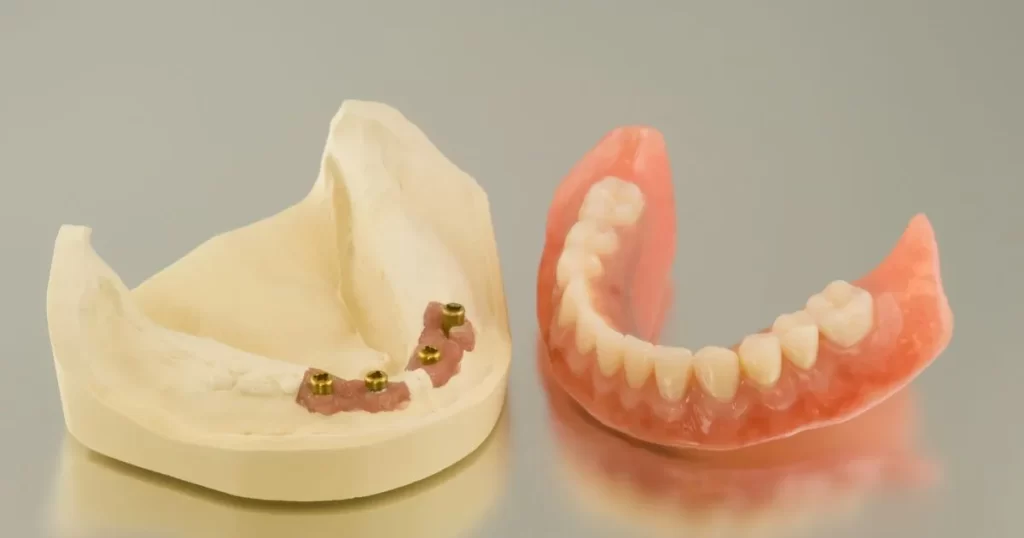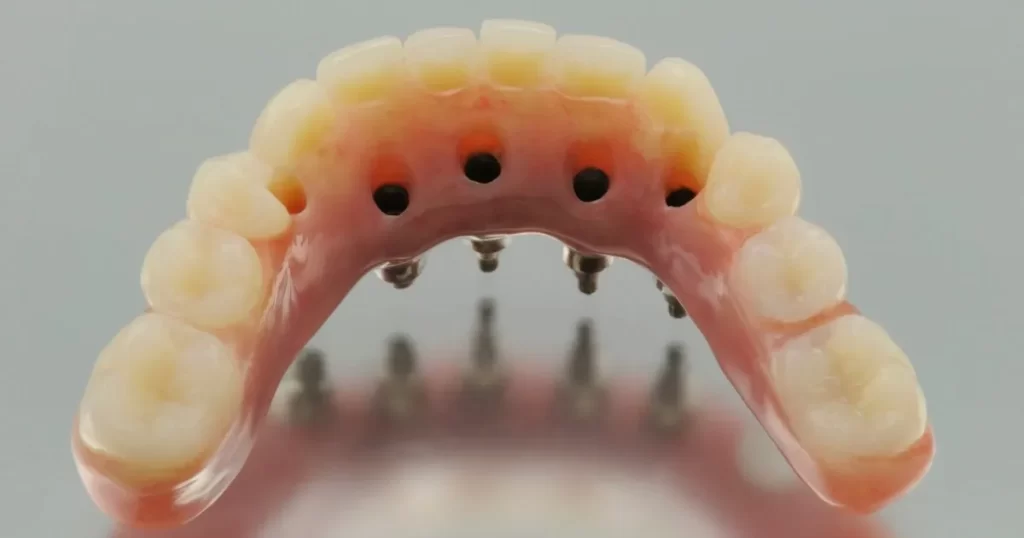The All-on-4 dental implant procedure is a revolutionary technique that provides a permanent solution for patients who have lost most or all of their teeth. With this procedure, patients can regain their confidence and smile with a full set of beautiful teeth. In this article, we will discuss the All-on-4 dental implant procedure in detail, from start to finish.

The All-on-4 dental implant procedure is a surgical procedure that involves the placement of four dental implants in the upper or lower jaw to support a full arch of replacement teeth. The procedure is designed to provide a permanent solution for patients who have lost most or all of their teeth due to decay, gum disease, trauma, or other reasons.
The All-on-4 dental implant procedure is a minimally invasive surgery that can be completed in a single day, and patients can leave the clinic with a new set of teeth that look and feel like natural teeth. The procedure is a popular alternative to traditional dentures or partial dentures, which can be uncomfortable, cause embarrassment, and require regular maintenance.
The first step in the All-on-4 dental implant procedure is a consultation with a dental professional. During this appointment, the dental professional will examine the patient’s mouth and jawbone to determine if they are a suitable candidate for the procedure. The dental professional may use X-rays or other imaging technology to assess the condition of the patient’s teeth, gums, and jawbone.
The All-on-4 dental implant procedure begins with an initial consultation with a dental professional. During the consultation, the dental professional will evaluate the patient’s oral health and determine if the patient is a suitable candidate for the procedure.
If the patient is a suitable candidate for the All-on-4 dental implant procedure, the next step is treatment planning. The dental professional will develop a treatment plan that outlines the steps involved in the procedure and the cost of the treatment. The treatment plan may also include information on the type of materials used for the implants and replacement teeth.
Suitable candidates for the procedure, the dental professional will develop a treatment plan. The treatment plan will also include details about the number of implants required, the type of replacement teeth to be used, and any additional procedures that may be necessary.
Before the procedure, the dental professional may recommend that the patient avoid eating or drinking for a certain period of time. The dental professional may also prescribe antibiotics or other medications to reduce the risk of infection.
The All-on-4 dental implant procedure is typically performed under local anesthesia. The dental professional may also offer sedation options, such as oral sedation or intravenous (IV) sedation, to help the patient relax during the procedure.
On the day of the procedure, the dental professional will administer local anesthesia to numb the patient’s mouth and jaw. They will then make four small incisions in the gum tissue and drill small holes in the jawbone to place the implants. The dental implants are made of titanium, which is a biocompatible material that fuses with the jawbone to provide a secure foundation for the replacement teeth.
During the procedure, the dental professional will place the All-on-4 implants into the jawbone. The implants are strategically placed to provide maximum support for the replacement teeth.
After the dental implants are placed, the dental professional will attach the replacement teeth to the implants. The replacement teeth are custom-made to match the size, shape, and color of the patient’s natural teeth. The dental professional will adjust the replacement teeth to ensure a comfortable fit and optimal function.
After the implants have been placed, the dental professional will attach the replacement teeth to the implants. The replacement teeth are custom-designed to match the patient’s natural teeth in color, shape, and size.

After the procedure, the dental professional will provide instructions on post-procedure care. Patients may experience some discomfort and swelling in the days following the procedure, but this can be managed with pain medication and ice packs. Patients will need to follow a soft food diet for several days after the procedure and avoid smoking or drinking alcohol for a period of time.
These post-procedure care instructions may include instructions on how to care for the replacement teeth, how to manage any discomfort or swelling, and when to follow up with the dental professional.
The All-on-4 dental implant procedure provides patients with a new set of teeth that look and feel like natural teeth. The replacement teeth are custom-made to match the patient’s natural teeth, which improves the appearance of their smile.
Patients who have lost most or all of their teeth may experience a loss of confidence and self-esteem. The All-on-4 dental implant procedure can help patients regain their confidence and self-esteem by providing them with a full set of teeth that look and feel natural.
Patients who have lost most or all of their teeth may experience difficulty speaking and eating. The All-on-4 dental implant procedure can improve speech and eating ability by providing patients with a stable set of replacement teeth that function like natural teeth.
The All-on-4 dental implant procedure provides patients with a long-term solution for tooth loss. The dental implants are designed to fuse with the jawbone, which provides a permanent foundation for the replacement teeth.
The replacement teeth attached to the All-on-4 implants are easy to maintain. Patients can brush and floss the replacement teeth just like natural teeth, and they do not need to be removed for cleaning.
Like any surgical procedure, the All-on-4 dental implant procedure carries some risks and potential complications. These may include:
There is a risk of infection following any surgical procedure, including the All-on-4 dental implant procedure. Patients can reduce the risk of infection by following the post-procedure care instructions provided by the dental professional.
In rare cases, an All-on-4 implant may fail to fuse with the jawbone. This can result in the dental implant becoming loose or falling out. Dental Implant failure may occur due to poor bone quality, inadequate implant placement, or other factors.
There is a risk of nerve damage during the All-on-4 dental implant procedure. Nerve damage can cause numbness or tingling in the mouth, lips, or tongue. In rare cases, nerve damage may be permanent.
The All-on-4 dental implant procedure may involve drilling through the sinus cavity in the upper jaw. In some cases, this can result in sinus complications, such as sinusitis or infection.
Patients should discuss the risks and potential complications of the All-on-4 dental implant procedure with their dental professional before undergoing the procedure.
The cost of the All-on-4 dental implant procedure varies depending on several factors, including:
The cost of the procedure may vary depending on the geographic location of the dental professional performing the procedure. In general, the cost of the procedure is higher in metropolitan areas than in rural areas.
The cost of the procedure may vary depending on the number of implants required. Some patients may require more than four dental implants to support a full arch of replacement teeth.
The cost of the procedure may vary depending on the type of replacement teeth used. Some materials, such as porcelain, may be more expensive than others.
Patients may require additional procedures, such as bone grafting or tooth extraction, which can increase the cost of the procedure.
In general, the cost of the All-on-4 dental implant procedure ranges from $20,000 to $40,000 per arch. Patients should discuss the cost of the procedure with their dental professional before undergoing the procedure.
The All-on-4 dental implant procedure is a suitable option for patients who have lost most or all of their teeth due to decay, gum disease, trauma, or other reasons. Suitable candidates for the procedure should:
Suitable candidates for the procedure should have adequate bone density to support the All-on-4 implants. Patients with inadequate bone density may require additional procedures, such as bone grafting, to prepare the jaw for the dental implants.
Suitable candidates for the procedure should be in good general health. Patients with certain medical conditions, such as uncontrolled diabetes, may not be suitable candidates for the procedure.
Smoking can increase the risk of dental implant failure and other dental implant complications. Suitable candidates for the procedure should be non-smokers or willing to quit smoking before the procedure.
Suitable candidates for the procedure should have realistic expectations about the results of the procedure. The replacement teeth attached to the All-on-4 implants will look and function like natural teeth, but they may not be identical to the patient’s natural teeth.
Patients should discuss their candidacy for the All-on-4 dental implant procedure with their dental professional.

The All-on-4 dental implant procedure is a popular and effective solution for patients with multiple missing teeth or complete tooth loss. The procedure involves placing four implants in the jawbone to support a full arch of replacement teeth.
Suitable candidates for the procedure should have good oral health, be in good general health, be non-smokers, and have realistic expectations about the results of the procedure.
The procedure typically involves several steps, including an initial consultation, treatment planning, pre-procedure preparation, implant placement, attachment of replacement teeth, and post-procedure care.
Patients can reduce their risk of complications by following post-procedure care instructions and attending all follow-up appointments with their dental professional.
The cost of the All-on-4 dental implant procedure varies depending on several factors, including geographic location, dental professional experience, additional procedures, and type of replacement teeth.
Patients should discuss the cost of the procedure with their dental professional and check with their insurance provider to determine if any portion of the cost is covered.
Overall, the All-on-4 dental implant procedure can provide patients with a new set of permanent teeth that look, feel, and function like natural teeth. It can significantly improve the quality of life for those who have suffered from tooth loss and can help restore their confidence in their smile and ability to eat and speak comfortably.
If you are considering the All-on-4 dental implant procedure, it is important to find a dental professional with experience and expertise in implant placement. They can help guide you through the process and answer any questions or concerns you may have.
The All-on-4 dental implant procedure is a great option for those seeking a permanent and natural-looking solution for multiple missing teeth or complete tooth loss. It involves the placement of four implants in the jawbone to support a full arch of replacement teeth.
While the procedure carries some risk of complications, patients can reduce their risk by following post-procedure care instructions and attending all follow-up appointments with their dental professional.
The cost of the procedure may vary depending on several factors, but patients should discuss the cost with their dental professional and check with their insurance provider to determine if any portion of the cost is covered.
Ultimately, the All-on-4 dental implant procedure can greatly improve the quality of life for those who have suffered from tooth loss and can provide a permanent solution for a confident and healthy smile.
- All on 4 Dental Implants: The Solution for a Complete Smile Makeover
- Full-Arch Restoration: A Comprehensive Guide to All On Four
- Dental Implant-Supported Dentures Everything You Need to Know
- Teeth in a Day: The Fastest Way to Restore Your Smile
- Determining whether the All-on-4 dental treatment option is the most suitable choice.
- 4 Dental Implants












